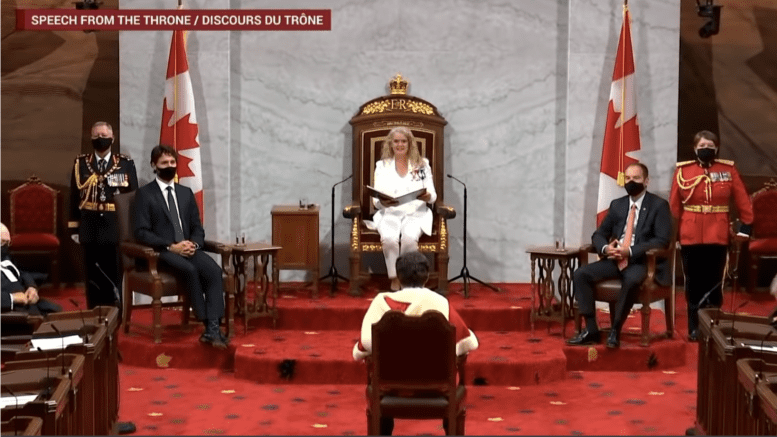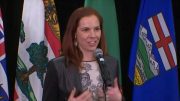“Now is not the time for austerity,” was one of the key lines from the Liberal government’s throne speech on Wednesday.
The speech addressed the COVID-19 pandemic, climate change, reconciliation and several other major issues affecting the Northwest Territories.
Officially called the Speech from the Throne, this is a practice that opens every new session of Parliament, introducing the government’s direction and goals.
Although the speech is written by the ruling party — it is delivered at Parliament Hill by the Governor General, in this case Julie Payette.
The ceremony starts the same every time, with trumpets, cannons and a ceremonial black rod.
Although it started the same, the content of the speech was very different from years past, focusing largely on a singular issue — COVID-19.
It took Payette over an hour to read the speech in entirety.
COVID-19
The government faces no shortage of challenges as cases of COVID-19 rise across the country.
The pandemic has left a heavy toll on Canada’s economy and healthcare system.
Combatting COVID-19 and repairing the economy were a focus of the speech
“The pandemic is the story of parents who have died alone, without loved ones to hold their hands. It is the story of kids who have gone months without seeing friends, of workers who have lost their jobs,” read Payette.
Some of the solutions the speech promises include creating one million jobs — although no specifics were included — and extending the wage subsidy into summer 2021.
Reconciliation
The government spoke of its commitment to reconciliation including the implementation of the recommendations by the Inquiry into Missing and Murdered Indigenous Women and Girls.
This is an overdue promise for the federal government, that was supposed to have implemented the National Action Plan before this past June.
But in a press conference after the speech, Premier Caroline Cochrane said she is happy this remains a priority.
“I was really glad to hear that the federal government is looking at it again,” she says.
She says her own government will be completing a territorial action plan and will then work with the federal government to launch a national one.
The speech says the government will adopt the United Nations Declaration on the Rights of Indigenous Peoples before the end of the year.
It also pledged to provide funding for distinction based Indigenous health legislations — a system designed to meet the needs of each Indigenous group — and distinction based mental health and wellness.
“The Government will walk the shared path of reconciliation with Indigenous Peoples,” read Payette, “by continuing to close the infrastructure gap in Indigenous communities, working on a distinctions-basis with First Nations, Inuit, and the Métis Nation to accelerate the government’s 10-year commitment.”
The environment
The environment is another issue very personal to the NWT.
“The government will continue its policy of putting a price on pollution while putting that money back in the pockets of Canadians,” says the speech.
The speech pledged to exceed Canada’s 2030 climate goal and aim to hit net zero emissions by 2050.
Cochrane said climate action is critical for the future of the territory.
“Climate change is affecting the whole of the world, but the North is feeling it the most,” she says.
Affordable housing and connectivity
Another major issue facing the North, which the speech touched on, was affordable housing and access to broadband internet.
“To keep building strong communities, over the next two years the Government will also invest in all types of infrastructure, including public transit, energy efficient retrofits, clean energy, rural broadband, and affordable housing, particularly for Indigenous Peoples and northern communities,” the speech says.
Cochrane said she is pleased the government will be prioritizing these subjects, which are major obstacles for residents of the NWT.
Housing in a particular has been a worsening crisis for the territory, but one with a fairly straightforward solution, Cochrane said.
“A lot of things you can’t solve with money… However, when it comes to housing, we need money,” she said. “The cost of housing compared to the southern jurisdiction is at least double.”
Cochrane says she’ll be bringing this subject to the federal government at the next meeting.
“If our costs our double, we should be getting double the funding,” she said
The Liberal government may not even have the chance to follow through on any of these promises.
The Conservative Party says it will not support the throne speech. So the minority government will need votes of confidence from either the NDP or the Bloc Québécois.
If not, another election and throne speech will be on the horizon.









